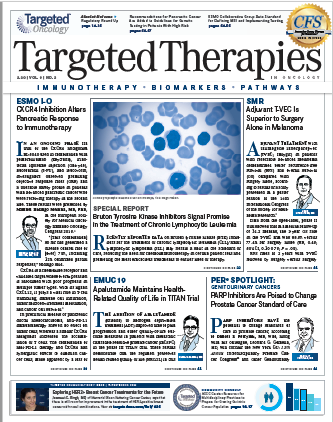Infigratinib Treatment Induces Responses in Urothelial Carcinoma, Leading to Phase III Trial
Frequencies of certain genomic mutations associated with upper tract urothelial carcinoma versus urothelial carcinoma of the bladder may serve as the rationale for differ­ing response rates, Sumati V. Gupta, MD, said during a presentation of the data at the 11th European Multidis­ciplinary Congress on Urological Cancers.
Sumati V. Gupta, MD

Sumati V. Gupta, MD
Patients with advanced or metastatic urothelial cancer harboringFGFR3alterations who had progressed on or were intolerant to plat­inum-based chemotherapy saw promising responses with infigratinib monotherapy, with marked improve­ments seen in upper tract urothelial carcinoma (UTUC) specifically. Frequencies of certain genomic mutations associated with UTUC versus urothelial carcinoma of the bladder (UCB) may serve as the rationale for differ­ing response rates, Sumati V. Gupta, MD, said during a presentation of the data at the 11th European Multidis­ciplinary Congress on Urological Cancers.1
Data for the analysis came from an expansion cohort of a phase I study of infigratinib in patients with advanced or metastatic urothelial carcinoma withFGFR3-activating mutations or fusions and prior plati­num-based chemotherapy, unless contraindicated.
The study enrolled 67 patients, 8 of whom had UTUC. Seventy percent of these patients had received ≥2 prior antineoplastic therapies. Patients received daily oral infigratinib 125 mg for 3 weeks on and 1 week off. The overall response rate was 25.4%, and the disease control rate (DCR) was 64.2%.1,2In the overall cohort, the most common adverse effects observed were hyperphosphatemia, elevated creatinine, fatigue, constipation, and decreased appetite.2
In the current analysis, investigators examined the difference in response rate to infigratinib treatment between patients with UCB and UTUC. Of the 8 patients with UTUC, 1 had a complete response (CR) and 3 had a partial response. The remaining patients with UTUC had a best response of stable disease, for a DCR of 100%. One patient with UTUC and a tumor bearing anFGFR3-TACC3fusion responded to treatment with infi­gratinib and had CR at day 55, which continued until disease progression at day 260.
Patients with UTUC also achieved longer median progression-free survival (8.54 versus 3.65 months) and overall survival (21.8 versus 7.0 months) com­pared with patients with UCB.
Genomic profiling used DNA isolated from forma­lin-fixed, paraffin-embedded tumor tissue samples and cell-free DNA (cfDNA) obtained from plasma from study patients. DNA from tissue samples from 39 UCB and 7 UTUC tumors were analyzed, and oncoplots were generated. Alterations were seen inFGFR3per the study criteria; genomic alterations to theTERTgene promoter, loss ofCDKN2AorCDKN2Bby deletions or mutations, chromatin-remodeling gene alterations, and activation ofPIK3CAwere commonly co-occurring in UCB and UTUC samples. The frequencies of alterations varied in UCB versus UTUC, which are comparable to results of a prior study demonstrating differences in frequencies in gene alterations between these cancer types.3
The oncoplots demonstrate a more complex genom­ic profile, with an increased number of known or likely deleterious mutations and copy number alterations in tissue from patients with urothelial carcinoma of the bladder versus [patients with] upper tract urothelial carcinoma,” said Gupta, who is an assistant professor in the Division of Oncology, Department of Medicine, at University of Utah’s Huntsman Cancer Institute in Salt Lake City. “Amplification of genes involved inFGFRsignaling, includingFGFR3ligands FGF3, -5, and -19 on chromosome 11 andFGFRadapter proteinFRS2, were more common in UCB compared with UTUC.”
TERTpromoter mutations were seen in both groups; however, they were more common in patients with UCB. Only 1 patient with UTUC had a significantly high muta­tional load, but this was likely due to a mutation inMSH2,which is involved in DNA mismatch repair. Mutations in regions outside the immunoglobulin-like domain were seen in UCB samples only. Additionally,FGFR3-TACC3fusions andFGFR3R248RC mutations were more com­mon andFGFR3S249C mutations were less common in UTUC versus UCB.
FGFR3alterations in cfDNA were concordant with the alterations seen in tissue samples in 79% of patients for whom both tumor tissue samples and cfDNA were available (39 patients with UCB and 5 with UTUC). “Again, a more complex genomic profile was seen with an increased mutational load in patients with bladder cancer versus patients with upper tract urothelial carci­noma,” Gupta said.
The investigators attempted to correlate clinical char­acteristics of the disease to the presence or absence ofFGFR3mutations in cfDNA for samples with at least 1 genetic alteration detected in the plasma. These characteristics included tumor length, ECOG performance status, and sites of metastases. However, the inves­tigators found no correlation betweenFGFR3allele frequency and clinical characteristics with response. A previous study suggested that the differences in genetic alteration frequencies may be important when considering targeted therapies for UCB versus UTUC.3
“We concluded that different patterns of genomic alterations are seen in patients with urothelial cancer of the bladder and upper tract urothelial carcinoma,” Gupta said. “This underscores the distinct biology of these diseases.”
Gupta concluded by stating that the results with infi­gratinib in UTUC support a planned phase III adjuvant study, predominantly in this population. The planned study, PROOF 302 (NCT04197986), is comparing adju­vant infigratinib versus placebo for invasive urothelial carcinoma with susceptibleFGFR3alterations.
References
- De Giorgi U, Pal SK , Rosenberg JE, et al. Activity of the FGFR13 inhibitor infigratinib in patients with upper tract urothelial carcinoma and urothelial carcinoma of the bladder: latest efficacy findings and comprehensive genomic profiling/cell-free DNA data.Eur Urol. 2019;18(11):e3405-e3406. doi: 10.1016/S1569-9056(19)34582-8.
- Pal SK, Rosenberg JE, Hoffman-Censits JH, et al. Efficacy of BGJ398, a fibroblast growth factor receptor 1-3 inhibitor, in patients with previously treated advanced urothelial carcinoma withFGFR3alterations.Cancer Discov. 2018;8(7):812-821. doi: 10.1158/2159-8290.CD-18-0229.
- Sfakianos JP, Cha EK, Iyer G, et al. Genomic characterization of upper tract urothelial carcinoma.Eur Urol. 2015;68(6):970-977. doi: 10.1016/j.eururo.2015.07.039.

Survivorship Care Promotes Evidence-Based Approaches for Quality of Life and Beyond
March 21st 2025Frank J. Penedo, PhD, explains the challenges of survivorship care for patients with cancer and how he implements programs to support patients’ emotional, physical, and practical needs.
Read More